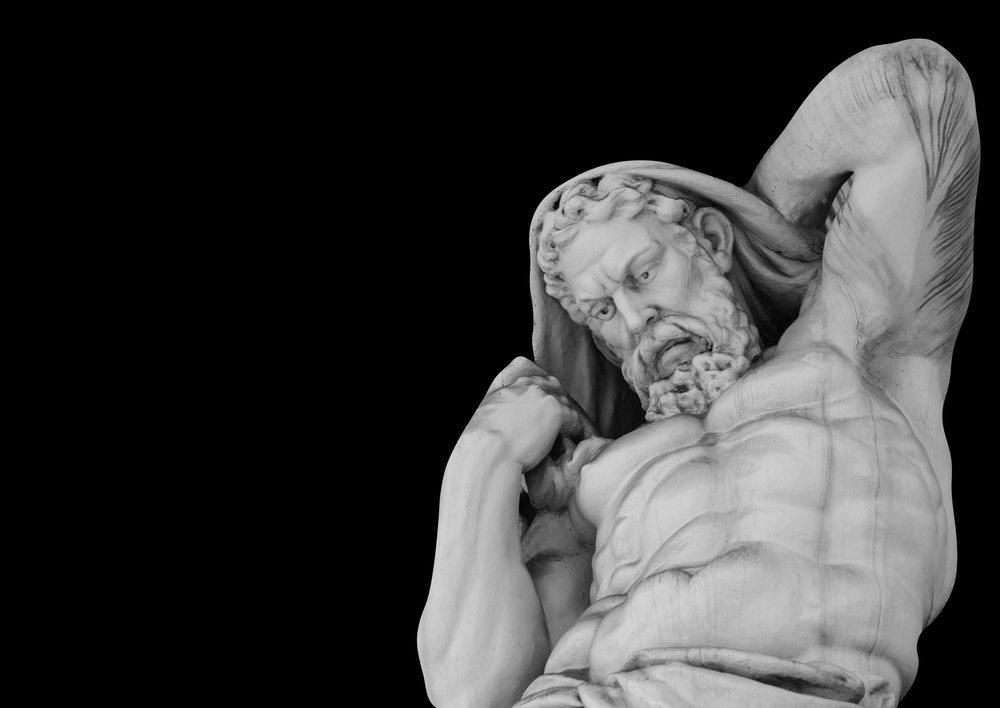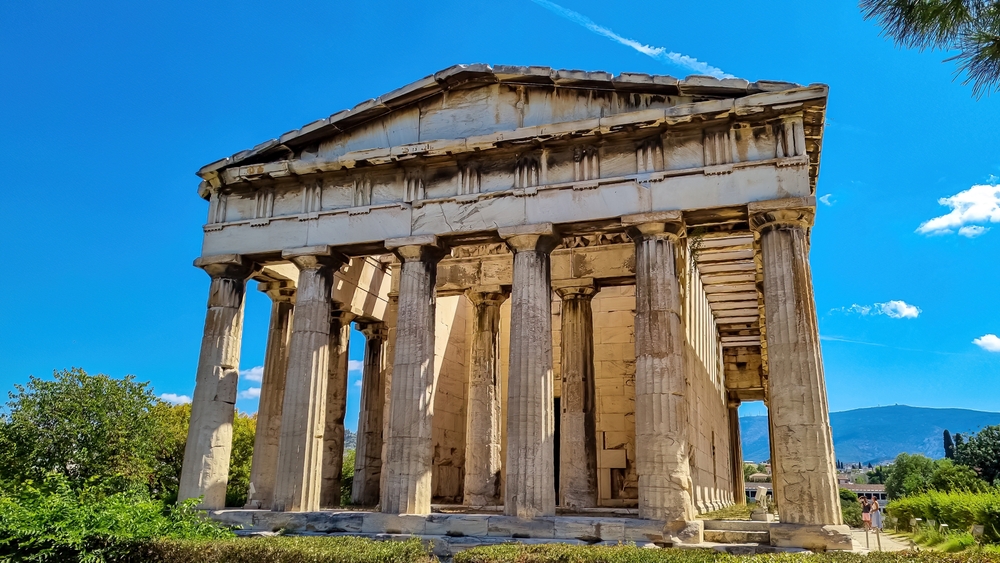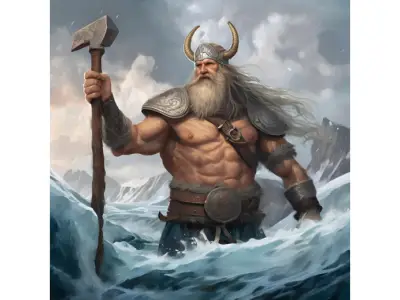Hephaestus, the Greek god of fire, blacksmiths, craftsmen, and volcanoes, is a unique and fascinating figure in Greek mythology. Unlike the dashing, powerful gods often depicted in stories and sculptures, Hephaestus's tales contain themes of resilience, ingenuity, and the beauty of imperfection.
Whether you're a mythology buff or simply curious about ancient stories, the saga of Hephaestus offers a treasure trove of lessons and insights. In this blog post, we'll explore the myths surrounding Hephaestus, his incredible powers, and the symbols that represent him.
Jump to:
Who Is Hephaestus?

Hephaestus, known as the god of fire and a master blacksmith, is a deity who turns adversity into strength. Born to Zeus, the king of the gods, and Hera, his queen, Hephaestus's start in life was anything but easy. The myths vary, but one popular tale recounts how he was cast out of Olympus as a baby because of his deformity, only to return with a display of his unmatched craftsmanship.
Hephaestus’s Myths
Hephaestus is featured in a series of myths that highlight his complexities as a god of fire, craftsmanship, and resilience. These stories reveal his character while illustrating the enduring lessons of Greek mythology.
The Turbulent Tale of His Birth and Fall
What did Hera do to baby Hephaestus, you might ask? According to legend, Hera, horrified by his physical imperfections, threw him from Mount Olympus. Another version suggests that Zeus tossed him from the heavens as punishment for siding with Hera in an argument. Despite this rocky start, Hephaestus's resilience shines, showcasing his ability to overcome adversity.
The Creation of Pandora
One of Hephaestus's most popular myths involves the creation of Pandora, the first woman on Earth. Commissioned by Zeus to craft her as part of a curse on humanity for Prometheus's theft of fire, Hephaestus's skill gave life to Pandora. She was given gifts from each god, making her the bearer of the beauty and the woes that would befall humanity. This story reflects Hephaestus's unparalleled craftsmanship and his role in divine retribution and human fate.
The Binding of Hera
Another tale recounts the time Hephaestus sought revenge against his mother, Hera, for her cruelty towards him. Hephaestus crafted a magnificent throne that, upon Hera sitting, bound her magically, rendering her unable to stand. It was only after Dionysus, the god of wine, got Hephaestus drunk and persuaded him to return to Olympus that Hera was freed. This myth highlights Hephaestus's cunning and struggle for acceptance and respect among the gods.
The Quarrel of Achilles and Agamemnon
Hephaestus's influence extends to the epic tales of human heroes, such as in Homer's "Iliad." During the quarrel between Achilles and Agamemnon, Hephaestus intervened to prevent a deadly escalation, showcasing his role as a peacemaker. He created a spectacle that distracts the assembly of gods and goddesses, underscoring his contributions to maintaining balance and order amidst divine and mortal conflicts.
Powers and Skills of Hephaestus
Hephaestus's remarkable powers and skills reflect the ancient world's respect for the art of creation and innovation.
Master Blacksmith and Craftsman
Hephaestus's most celebrated powers lie in his skill as a blacksmith and craftsman. He fashioned the gods' magnificent weapons and armour, including Zeus's thunderbolt, Hermes's winged helmet, and Achilles's shield. His workshops, believed to be located in the heart of volcanoes, were where magic met metal, crafting items with divine powers.
Ingenuity and Creativity
Beyond his physical creations, Hephaestus's ability to solve problems through inventive means is among his greatest powers. His creations, including automatons to assist in his workshop, showcase his forward-thinking and problem-solving prowess.
Control Over Fire and Volcanoes
As the god of fire, Hephaestus controlled this primal element, harnessing its destructive and creative potential. This power allowed him to manipulate the fire of the hearth and the fiery eruptions of volcanoes, which were said to be the forges of his most magnificent creations.
The Power of Healing and Restoration
Lesser known but equally fascinating is Hephaestus's ability to heal and restore. He crafted special ointments that could heal wounds and restore sight, showcasing a gentler aspect of his dominion over fire and transformation.
Artistry in Metalwork and Sculpture
Hephaestus's talents were not confined to practical creations. He was also a master artist, capable of crafting lifelike statues and intricate jewellery imbued with magic. His sculptures were so realistic that they were believed to have the power to move and think, blurring the lines between art and life, craftsmanship and divinity.
Symbols of Hephaestus
The symbols associated with Hephaestus reveal his identity, powers, and the values he embodies within Greek mythology:
- The Anvil and Hammer: The anvil and hammer are the main symbols of Hephaestus, representing his role as the god of blacksmiths and artisans. These tools symbolise creation through hard work and resilience, themes echoing Hephaestus's myths.
- The Volcano: As the god of fire and volcanoes, Hephaestus is closely associated with volcanic eruptions. These natural phenomena symbolise his fiery nature and the raw, transformative power of his domain.
- The Quail: The quail is another symbol occasionally linked to Hephaestus. This bird, known for its sudden, powerful takeoffs, represents sudden bursts of inspiration and the ability to overcome challenges, much like Hephaestus's rise from adversity.
- The Tongs: Integral to the work of a blacksmith, the tongs symbolise Hephaestus's mastery over fire and ability to shape the world around him. They represent the precision, control, and careful handling required in both creation and manipulation of the elements.
- Fire: Beyond its association with volcanoes, fire itself is a profound symbol for Hephaestus. It embodies transformation, creativity, and the duality of destruction and rebirth.
- The Donkey: Lesser known but equally significant, the donkey symbolises Hephaestus's hardworking and steadfast nature. In some stories, he rides a donkey to signify his humility and connection to the common people, a god not of dazzling beauty or strength but of perseverance and skill.
Hephaestus's Relationships and Family Tree

Hephaestus is intricately connected to many deities and mortals through his family relationships and divine associations. Let's delve into the key relationships and family members that define Hephaestus's story.
Parents
- Zeus: The king of the gods, Zeus is Hephaestus's father. Their relationship is marked by tension and collaboration, reflecting the complicated dynamics of the Olympian family.
- Hera: Hera, the queen of the gods, is Hephaestus's mother. Hera's relationship with Hephaestus is complex, starting with his rejection at birth, yet she also relies on his skills as a craftsman.
Spouse
- Aphrodite: The goddess of love and beauty, Aphrodite is Hephaestus's wife. Their marriage is filled with challenges, notably Aphrodite's infidelity, which creates tension and drama in mythological tales.
Siblings
- Ares: The god of war, Ares is Hephaestus's brother and rival, especially due to Ares's affair with Aphrodite.
- Athena: The goddess of wisdom and warfare, Athena shares a professional and respectful relationship with Hephaestus, often collaborating on various divine projects.
- Hebe: The goddess of youth, Hebe is Hephaestus's sister, with their interactions being less often featured in myths but still significant within the family dynamic.
- Eris: The goddess of strife, Eris is another sibling, though their interactions are not heavily detailed in the myths.
Children
- Erichthonius: A legendary figure who became an early king of Athens, Erichthonius was born from the earth after an attempted assault by Hephaestus on Athena, making his lineage unique and significant to Athenian mythology.
- Various Automatons: While not biological, the automatons crafted by Hephaestus are often considered his children. These include mechanical servants, warriors, and animals that showcase his skill and creativity.
Notable Associations
- Prometheus: A titan and cousin to Hephaestus, Prometheus shares a bond with him through their mutual association with fire and the suffering they both endure at the hands of Zeus.
- Dionysus: The god of wine, Dionysus befriends Hephaestus and plays a key role in resolving the conflict between Hephaestus and Hera by bringing the former back to Olympus.
Hephaestus's Legacy

Hephaestus's enduring legacy continues in the modern world. Today, this god of fire and craftsmanship is celebrated through various forms of art and culture, from statues and sculptures to paintings and literature. His depiction often highlights his role as a master blacksmith, with representations focusing on his forge, anvil, and hammer, showcasing the tools of his legendary craft.
Statues of Hephaestus can be found in museums around the world, capturing his strength and skill. These sculptures, often crafted from bronze or marble, pay homage to his mastery over metal and fire. His influence extends into literature, where he is frequently portrayed as a symbol of ingenuity and resilience, inspiring characters who overcome adversity through creativity and technical prowess.
Moreover, Hephaestus has made his mark in popular culture, appearing in movies, television series, and video games, where his myths are reimagined for new audiences. Through these modern depictions, Hephaestus continues to inspire, reminding us of the importance of creativity, resilience, and intellect in overcoming challenges.
Frequently Asked Questions About Hephaestus
Did Hephaestus and Aphrodite Have Children?
Mythology provides varied answers about the offspring of Hephaestus and Aphrodite. While some tales suggest they had no children, others speak of several, including Eros (in some versions), the god of love, demonstrating the complex nature of their relationship.
What Caused Hephaestus's Death?
Greek myths rarely speak of the death of immortals, and Hephaestus is no exception. As a god, he is depicted as living on through the stories and the crafts he inspired among humans, a legacy of creativity and resilience.
Why was Hephaestus hated by some yet loved by others?
Hephaestus's story shows that even gods are not immune to the complexities of perception and reputation. Despite the challenges, Hephaestus's contributions to the gods and humanity cement his place as a deity of significance and respect.
How Did Hephaestus Become the God of Fire?
Hephaestus was associated with fire due to his unparalleled skill as a blacksmith and craftsman. The forge, his primary workspace, requires intense heat, linking him intrinsically to the element of fire. This association also encompasses his dominion over volcanoes, seen as the divine forges.
What Is Hephaestus's Roman Name?
In Roman mythology, Hephaestus is known as Vulcan. The transition from Greek to Roman culture saw his attributes adapted to Vulcan, emphasising his connection to fire, metalworking, and craftsmanship.
Did Hephaestus Have Any Rivals Among the Gods?
While Hephaestus was generally well-regarded for his skills, his most notable rivalry was with Ares, the god of war. This tension primarily stemmed from Ares's affair with Aphrodite, Hephaestus's wife, creating a contentious triangle in various myths.
How Did Hephaestus Contribute to the Trojan War?
Hephaestus's contributions to the Trojan War were primarily through his craftsmanship. He forged armour and weapons for the gods and heroes involved in the conflict. Notably, he created a stunning set of armour for Achilles, which played an important role in the war's latter stages.
Are There Any Temples Dedicated to Hephaestus?
One of the best-preserved ancient Greek temples, the Hephaisteion (Temple of Hephaestus), is located in Athens, Greece. This temple, dedicated to Hephaestus and Athena, underscores his importance in ancient Greek religion and culture.
What Are Some Modern Interpretations of Hephaestus?
In modern culture, Hephaestus has been interpreted in various ways, from literature and film to video games. These interpretations often highlight his skill, creativity, and resilience, making him a figure of inspiration for overcoming adversity and harnessing your talents.
Can Hephaestus Be Considered a Patron God of Engineers and Inventors?
Given his role as a divine inventor and craftsman, Hephaestus is often seen as a patron of engineers, inventors, and all those who work with metal and technology. His mythological inventions and automata make him a symbol of ingenuity and technological prowess.
Recommended for you!
Best SellersDiscover Greek Mythology with Centre of Excellence
Has the tale of Hephaestus ignited a spark of interest in Greek mythology within you? The stories of the gods and goddesses of Olympus are filled with lessons, drama, and insights into human nature. If you're keen to delve deeper into these ancient tales, our Greek Mythology Diploma Course offers a fantastic opportunity to explore this fascinating subject further.
Why Centre of Excellence?
- Accessibility: We are committed to making education accessible to all. Our Greek Mythology Diploma Course is priced affordably, ensuring that anyone interested in ancient stories can join us.
- Flexibility: Our courses are designed with your lifestyle in mind, allowing you to learn at your own pace. This flexibility makes it easy to weave your passion for mythology into your daily life.
- Wide-Ranging Topics: Dive into an extensive curriculum covering legendary tales of gods, goddesses, heroes, and monsters. Each module is designed to captivate, educate, and inspire, catering to various interests.
- Support: Enrolment comes with personalised tutor support and access to a community of like-minded learners. This ensures you're supported throughout your journey into Greek mythology.
Special Invitation
We are excited to offer our Greek Mythology Diploma Course for the exclusive price of £29, saving you over £100!













